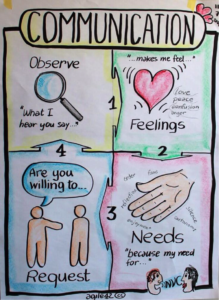Clear Verbal Communication
In a conversation or discussion many messages are being exchanged quite quickly and–unlike with written communication–there is rarely much time to reflect on a message you have received before responding to it. Things can easily get heated or muddled, particularly if there are strong feelings in the mix. So what can be done to keep verbal communication clear and effective?
Tips from Marshall Rosenberg – founder of Nonviolent Communication (NVC):

- Observe and recap: Observe from a neutral perspective and reflect back to the other a summary of what they have just said. This can help to clarify your understanding and make the other person feel validated and heard. Try to remain neutral without judgment and to use “I” language e.g. “I hear that you have some concerns about the new office”.
- Describe emotions, not positions: Describe your feelings rather than making objective statements, generalizations or placing blame. E.g. “I feel anxious about the new office” rather than “The new office is a big mistake.”
- Identify needs According to NVC, all the emotions we feel when upset come from a need that has not been met. If we can help each other through asking good questions to identify our needs, it is easier to find solutions that work for everyone. In order to communicate clearly what we need, we must know it for ourselves first
- Make a request Asking for concrete actions that can help to meet a need that has arisen will make your communication fruitful and focused. The success of your request depends upon timing. Try to make requests at a time when there is some understanding and connection between both parties. At this point the other person is most able to hear and receive your request.
Check out this 2.5 minute video with Marshall Rosenberg, founder of NVC, describing the basics of his method.

